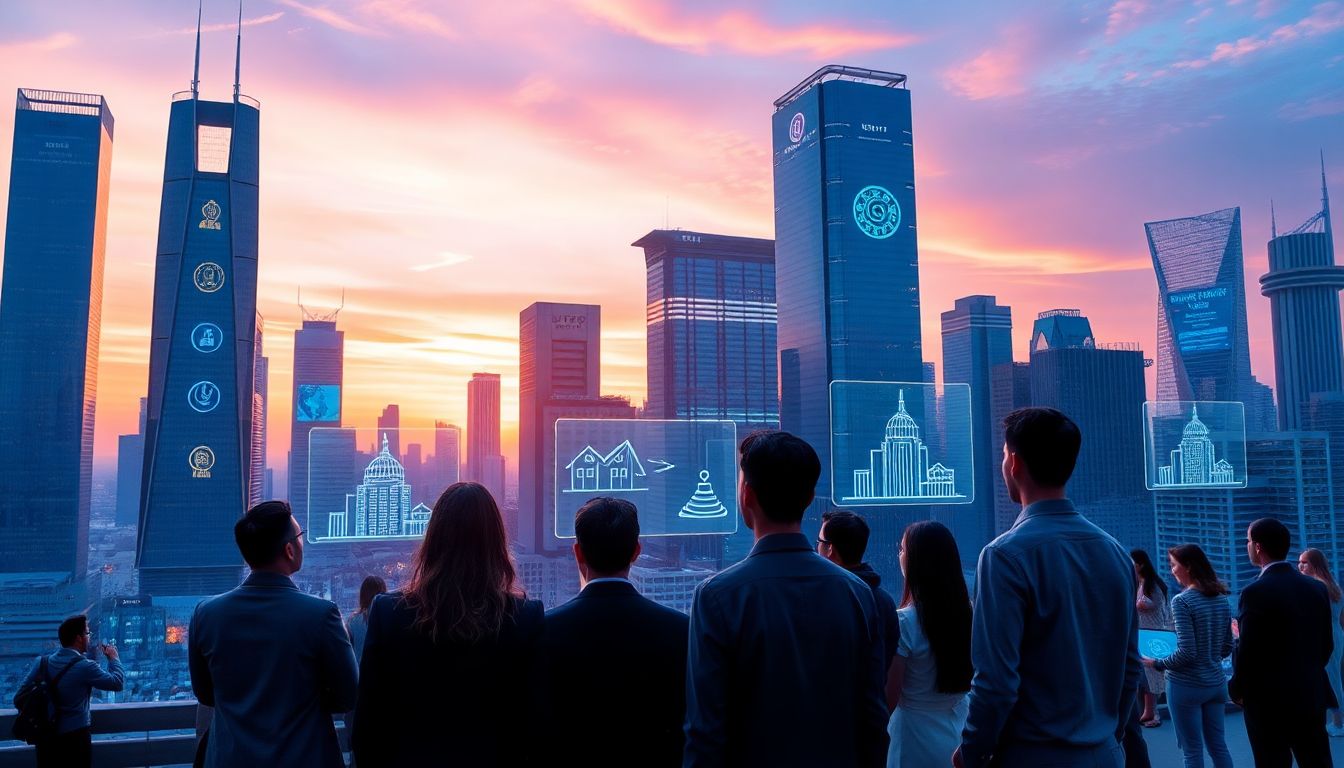
NFTs Evolve: From Digital Art to Real-World Applications in Real Estate and Intellectual Property
NFTs started as a craze for digital art and collectibles. People saw unique digital images, music, and videos sell for huge sums. Now, the buzz is about how NFTs are moving into real-world sectors. From property ownership to protecting ideas, NFTs are opening new doors. This article explores how non-fungible tokens are transforming real estate and intellectual property (IP). We’ll look at the benefits, challenges, and what’s coming next.
The Evolution of NFTs: From Digital Art to Broader Applications
The Origins and Growth of NFTs
NFTs, or non-fungible tokens, hit the scene around 2017. Projects like CryptoPunks and CryptoKitties brought attention. Their popularity soared in 2021, with sales hitting billions. OpenSea, the largest NFT marketplace, saw volumes explode. People bought and sold everything from art to virtual items. NFTs quickly became the next big thing in digital markets.
Transition Towards Real-World Utility
Why are NFTs moving beyond digital images? In tech and finance, companies see potential for new kinds of ownership. Blockchain’s transparency and security make it easier to trust digital assets. Interoperability between platforms also helps. This makes NFTs more than just images — they can represent real assets, like property or ideas.
NFTs in the Real Estate Sector
Digital Tokenization of Property Assets
One of the biggest shifts is turning physical property into NFTs. Instead of traditional deeds, owners get tokens. These tokens prove ownership of real estate. Some cities and companies are already testing this. Miami, for example, has luxury condos sold as NFTs. Blockchain-based property exchanges let buyers and sellers trade tokens easily.
Benefits of NFT-Based Property Transactions
NFTs bring many advantages to real estate. They boost liquidity, making it easier to buy or sell a share of a property. Fractional ownership allows investors to own small parts of large buildings. Blockchain creates transparency and keeps records safe. Plus, transactions cost less and settle faster, saving everyone time and money.
Challenges and Regulatory Considerations
But, there are hurdles too. Laws about NFT ownership differ globally. Many countries haven’t set rules for this new way of buying property. Risks like fraud or ownership disputes still exist. Experts in real estate say that understanding local laws and setting clear standards is vital. Without proper regulation, this market could face problems.
NFTs in Intellectual Property and Licensing
Securing and Monetizing IP Rights
NFTs also help protect creative work and inventions. They can show who owns a song, patent, or trademark. For example, music artist Kings of Leon released albums as NFTs, making it easy to sell rights directly to fans. Digital artists like Beeple sell their art as NFTs to get paid fairly and quickly.
Facilitating Licensing and Royalties
Smart contracts are behind many NFT platforms now. These are digital agreements that execute automatically. When a piece of art is sold or used, royalties get sent to creators without needing middlemen. This streamlines licensing and makes revenue more predictable for IP owners.
Protecting Creators and Innovators
NFTs are powerful tools to fight piracy and counterfeits. They verify genuine ownership and make copying harder. Creators also find new ways to earn money from their work. If you’re a writer or artist, using NFTs can open up many revenue streams. Tips for doing so? Keep your NFTs secure, work with trusted platforms, and promote your work.
Broader Impacts and Future Trends
Integration with Metaverse and Virtual Worlds
NFTs aren’t just for real world assets. They act as keys to virtual spaces. Think of owning a piece of land or a house inside a game or a virtual city. Platforms like Decentraland and The Sandbox already let users buy and manage virtual property with NFTs. These digital assets are shaping the future of online interaction.
Regulatory and Ethical Considerations
New rules are still coming. Governments around the world debate how to regulate NFTs and related activities. People worry about the environment because creating NFTs can use a lot of energy. Others worry about digital ownership rights or scams. Having clear standards will help this market grow safely.
Innovation and Market Opportunities
The future looks promising. We could see more industries adopting NFTs, from banking to fashion. Standards for blockchain and NFTs might connect different platforms, making trading easier. As adoption spreads, NFTs could become common tools for owning and managing assets — both online and offline.
Conclusion
NFTs are moving well beyond their start as digital collectible cards. They are now tools for real estate, IP rights, and beyond. They offer faster, cheaper, and more transparent transactions. But, challenges like regulation and security remain. Still, the potential for NFTs to brighten many industries is huge. By understanding these changes now, you can better prepare for the future of ownership in both digital and physical worlds. The next chapter of NFTs is happening right now — are you ready to be part of it?

0 Comments